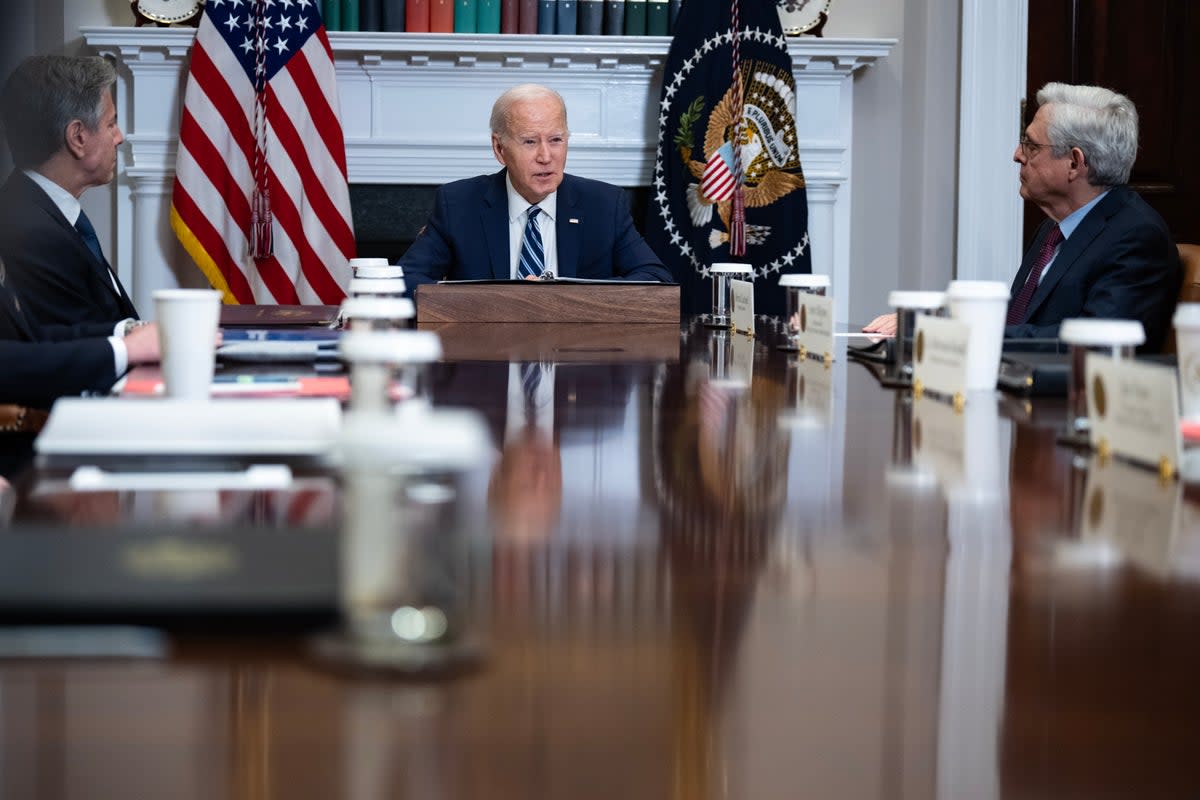Voices: Biden’s balancing act on Israel and Gaza

- Oops!Something went wrong.Please try again later.
- Oops!Something went wrong.Please try again later.
- Oops!Something went wrong.Please try again later.
- Oops!Something went wrong.Please try again later.
On Monday, the fourth exchange of hostages between Israel and Hamas took place as a pause in fighting extended for two additional days.
President Joe Biden has called the release of hostages “the start of a process” and told reporters on Sunday that “this deal is structured so that it can be extended” as a means of releasing more hostages and sending more humanitarian relief into Gaza. Specifically, he hailed the release of Abigail Idan, a four-year-old girl with American citizenship, saying, “Thank God she is home.”
My colleague Andrew Feinberg reported last week how Mr Biden and his “secret cell” of aides laid the groundwork for the pause and hostage exchange beginning with his visit to Tel Aviv after the October 7 massacre, with the president sometimes “directly and personally engaged to in this process throughout almost hour by hour.”
The parameters of Mr Biden’s balancing act seem to show that the president, one of Washington’s most experienced diplomatic hands, is trying to continue the longstanding practice of privately pressuring Israel while publicly supporting the nation. But it’s unclear whether this type of politicking can fit within the confines of the new Israeli political realities or the shifts in public opinion toward Israel both within the Democratic Party and domestic politics writ large.
Throughout his 50 years in politics – first as a senator who became chairman of the Foreign Relations Committee, then as a vice president who became Barack Obama’s most trusted diplomatic envoy and now as president – Mr Biden has witnessed and partaken in this diplomatic theatre. Indeed, his first year as a senator coincided with the last time that Israel faced a surprise onslaught when Israel’s Arab neighbors engaged in an attack on the Yom Kippur War.
Similarly, former president Jimmy Carter brokered peace between Egypt and Israel, while former president Ronald Reagan pressured Israel during the war in Lebanon, going as far as to say about Israel’s actions: “It's a holocaust.” Conversely, George HW Bush, a former US ambassador to the United Nations, clashed with Israel on the topic of settlements. Meanwhile, Bill Clinton famously brokered the Oslo Accords with Israeli Prime Minister Yitzhak Rabin and Palestinian leader Yasser Arafat before he ultimately failed to broker a deal on peace before the end of his presidency.
But that dynamic no longer exists. For one, Israeli Prime Minister Benjamin Netanyahu has shown that he is not as pliable as his predecessors. Mr Netanyahu spent much of his youth in America, growing up in Pennsylvania and he still speaks English with a distinctly Philly accent.
He has held American citizenship in the past and in 2001, Mr Netanyahu, after his first tenure as prime minister ended, said on video, “America is a thing you can move very easily, move it in the right direction. They won't get in their way” (Mr Clinton for his part said Mr Netanyahu “killed” the peace process).
Unsurprisingly, given his massive unpopularity in Israel even before the attack, Mr Netanyahu elected for his first one-on-one interview since the 7 October massacre to be with an American outlet, ABC News. Mr Netanyahu’s defiance, especially as he feels that he might be reaching the end of his political career, means the United States has much less leverage in negotiations.
At home, Mr Biden is now grappling with the fact that many voters, including many that he needs to win re-election, have seen only the public support and not the private pressure. Last week, we broke down how many younger voters overwhelmingly disapprove of his stance on Israel. Similarly, a Reuters/Ipsos poll from this month showed that 68 per cent of respondents supported a ceasefire.
Furthermore, stories have abounded of Muslim Americans in the key swing state of Michigan becoming dissatisfied with the president to the point they may sit out the 2024 election. Indeed, Mr Biden seems to recognise that he has angered Arab-American voters, as friends of Inside Washington John Hudson and Yasmeen Abutaleb reported in The Washington Post that Mr Biden apologised to Arab-American leaders after he cast doubt on the death toll in Gaza.
Throughout much of his time as an elected official, as my colleague Josh Marcus has noted, Mr Biden has shown himself to be a political chameleon. He went from opposing same-sex marriage to supporting transgender rights; from voting to support the Iraq War to becoming sceptical of American military efforts in Afghanistan; and from expressing serious misgivings about abortion as an octogenarian white Catholic man to campaigning heavily on abortion rights.
But his rhetoric and actions show that, in some ways, Mr Biden is still a product of the Washington foreign policy establishment and has to figure out how to accept the new political realities before him.
